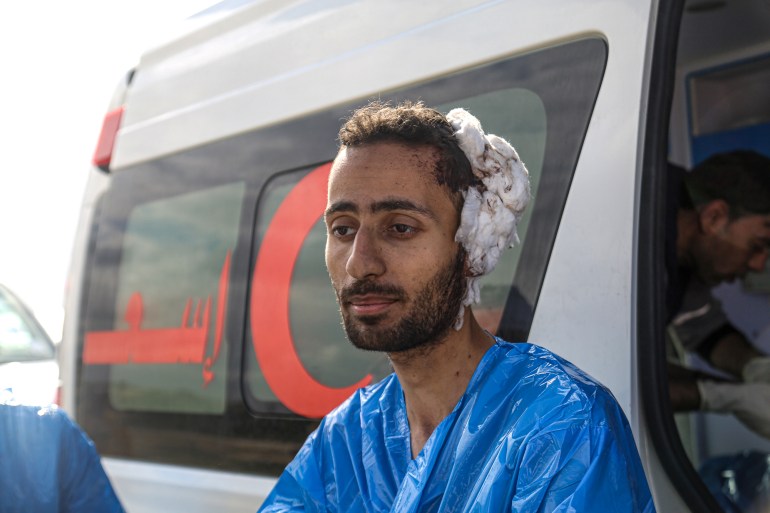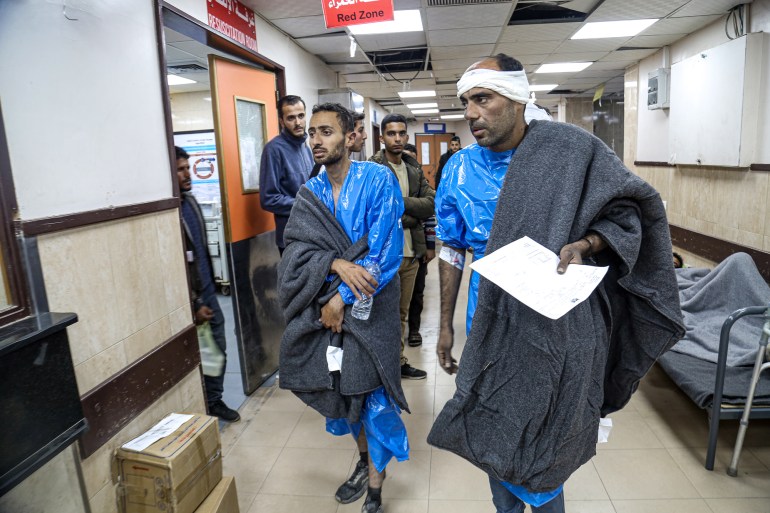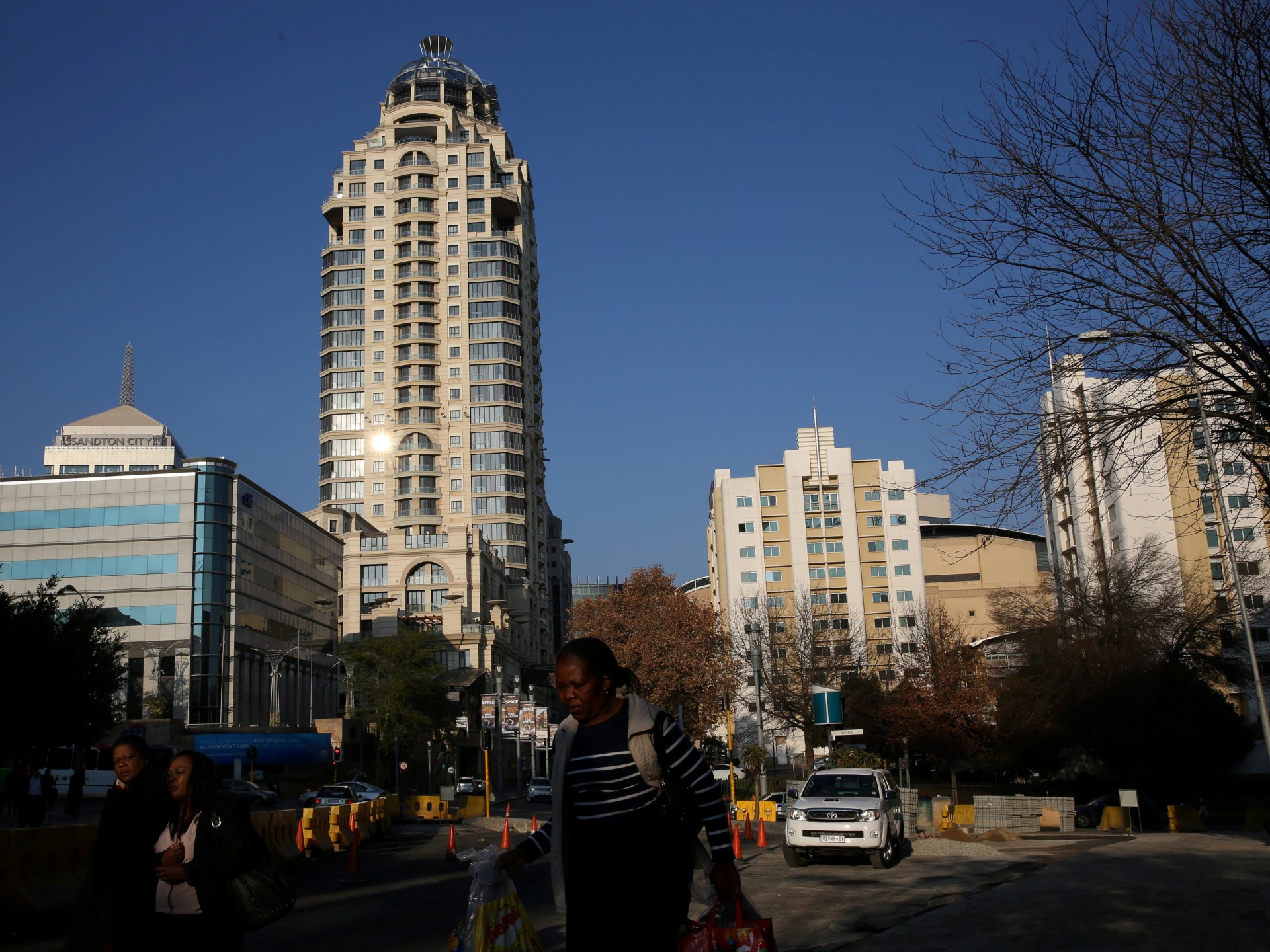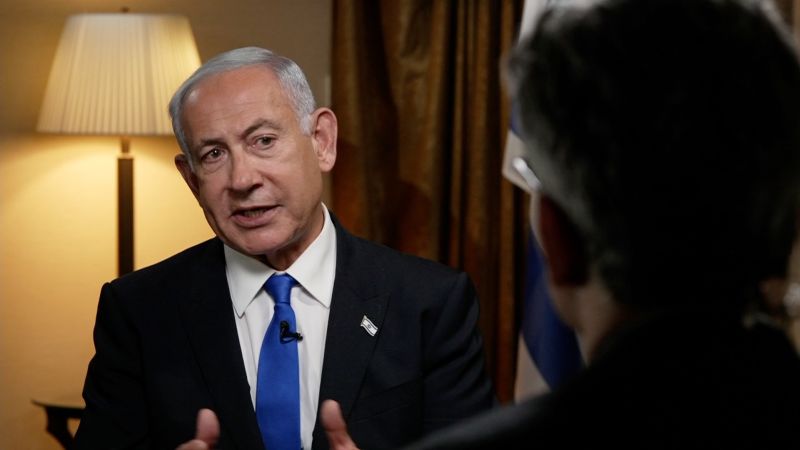As those fleeing al-Shifa get to south Gaza, they recount Israeli torture
Deir el-Balah, Gaza – Mohammad Sukkar is safe now – or safer – but even as the team at Al-Aqsa Martyrs Hospital in Deir el-Balah work to help him, his eyes fill with tears as he recounts his experience in al-Shifa Hospital.
The 27-year-old man fled south, wounded and stripped of his clothes, after days of siege and then detention by the Israeli army in the Shifa complex, along with dozens of other people.
“I had been displaced from al-Shujayea east of Gaza, which was destroyed and I was volunteering at the hospital after being displaced,” Sukkar told Al Jazeera, lying on a makeshift pallet fashioned out of some rough grey blankets on the floor.
“Late on a Monday … there was intense gunfire as Israeli tanks advanced towards the hospital,” he said.
“We didn’t know what was going on. The Israeli army ordered us via loudspeakers to stay inside the complex buildings and not move at all.”
Sukkar and dozens of other displaced people – many of them families with children – were trapped, along with sick people, for four agonising days in a Shifa building.
“We had no water or food. We were starving, and so afraid of the artillery shelling. All we could hear was the army booming through loudspeakers, shooting people and burning buildings around us,” he said.
“We didn’t even think of going outside.”

‘Waving white flags’
As the siege continued and thirst took hold, some of the trapped people decided to venture out, waving white flags.
“We gathered – men, women, children, and the elderly – waving white flags and advancing cautiously,” Sukkar recalled.
“The army opened fire, forcing us to beg for safe passage, telling them we wanted to get out as we were starving and there was no water.
“The soldiers insisted we return to the building but then, minutes later, they called out that all the men should stay and line up and the women should gather and head south.”
The soldiers made the men strip and hold their hands above their heads as they handcuffed and blindfolded them.
“For four days, we were shackled in the cold in the hospital courtyard without food or water,” he said, pausing as a medic came by and administered some medication to him.
“If we asked for anything, the soldiers shouted at us, kicked us with their boots, spat at us, and insulted us with the most horrific words,” Sukkar continued.
Eventually, the soldiers released some of the detainees, ordering them to go south – without their clothes or belongings.
“We started walking towards al-Rashid Street. I was with five young detainees and we were all shivering from cold and fear. The roads were full of tanks and soldiers, bodies on the ground – but we kept walking, our hands raised above our heads.”
“When we reached an Israeli checkpoint, the soldiers stopped us, let the others pass but arrested me,” Sukkar said.
“I tried to ask where they were taking me, but they beat me. There were about 10 soldiers, all of whom were kicking me and using metal bars to hit me all over.”
After attacking him, the soldiers told Sukkar to go, but he had been beaten so hard he was not able to walk. So they loaded him into a military jeep and threw him out near the checkpoint.
“My hands and feet were very painful and bleeding. I was crawling until a passer-by saw me, gave me first aid, and took me to the hospital.”
‘Extreme terror’
Arriving at the Al-Aqsa Martyrs Hospital in an ambulance was Mohammad Marshoud, a thin, subdued 25-year-old man with a clump of soiled medical cotton taped to one side of his head.
He was injured when Israeli forces shelled his family’s home in the vicinity of the al-Shifa Hospital, where he was staying with 15 family members, including his elderly parents, his sisters, their children and some cousins.

After an ordeal that lasted days, Marshoud was able to walk to the south with his cousin, both of them badly injured and stripped of all their clothing. He does not know the fate of any of the rest of his family.
It was only when emergency response teams found them that they were able to give them blue plastic gowns to protect them from the cold a bit.
“We were sleeping when we were surprised by the Israeli tanks,” Marshoud said of the day the siege began around al-Shifa.
“We got ready to flee but when I opened the door, there were tanks on our doorstep.
“Everyone was in extreme terror. We cowered in a small corridor, unable to move with all the shooting. The children were crying and the women screaming in fear. We were sure we’d all die.”
Artillery shells exploded in the house, wounding Marshoud, his cousin, and his elderly father, all of whom were hit by shrapnel in the head and back.

“We weren’t able to call an ambulance. We crawled around to grab bits of clothing or medical gauze from here and there in the house so we could stop our wounds bleeding,” said Marshoud, who works as a nurse.
Israeli soldiers stormed the house and arrested all the men, including Marshoud’s father, who is 70.
“I had prepared for this moment, wrote a sign in English for the children to hold; it said: We are civilians and children only. Please help us,” Marshoud said.
“But they didn’t care, they just arrested the men and ordered us to strip.”
The soldiers took Marshoud, his father, and his cousin to a nearby building where they had detained other men.
“Our wounds were still bleeding. The place was full of broken stones and they made us sleep on them,” he said.
“They beat us severely, pulled out my chest hair and tortured me. They wouldn’t let us go to the toilet … some of the people there wet themselves.”
After five days of detention, Marshoud and his cousin were released and ordered to go south.
“There were so many tanks. Quadcopters were hovering above us, bodies all over the roads.”
“All I can think about is my family … I can’t contact them, I don’t know where they are.”




